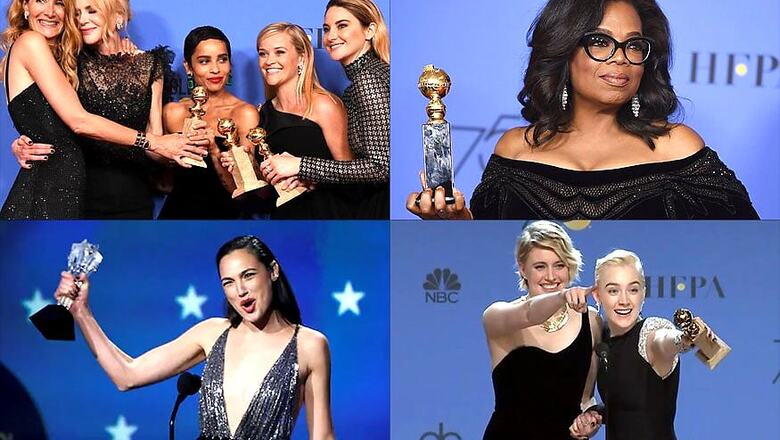
views
Last year, Hollywood saw one of the most dramatic changes in the last five decades when accusations of sexual assault against movie mogul Harvey Weinstein started pouring in. The series of accusations from the known and the unknown not only resulted in his downfall but ignited a revolution among the less-heard, who subsequently called out dozens of powerful men as guilty sexual predators. This new wave of woke-ness which started the #MeToo Campaign and is currently riding high with Time's Up Campaign establishes at least one fact - the time has come for women in Hollywood to voice their angst from the top of the iconic sign in LA so that the entire world can notice it.
The year gone by saw the rise of women both in terms of Hollywood content and its conscience. While the world took note of the wrong-doings resulting in a no holds barred naming and shaming of the guilty, the male-dominated content scene also saw dramatic shifts. Hollywood has long been awash in liberal thinking but it’s also a place steeped in tradition and habit, where like any other business- making money takes precedence. Divided into two co-existing eco-systems- one with the big money-making, VFX laden superhero films and other prestige pictures trotted out in hopes of winning an Oscar. Interestingly, the representation of women in both the spheres has been positive and noticeable.
The highest grossing film of last year- Beauty and The Beast had a Disney princess, modified for the better, by gender equality advocate Emma Watson. She was brave, free-spirited, independent and relatable despite living in a Disney Universe. Another big game changer was Patty Jenkins's Wonder Woman. DC's first female superhero was lauded by critics and audiences alike. It took a female director to show DC's Cinematic Universe how films are supposed to be adapted from comics (DC's past two outings, Dawn of Justice and Suicide Squad were not well received by even the most hardcore DC fans and critics). The fact that it was a woman director behind the screen who gave it a real perspective sans the voyeurism of the male gaze; this, unfortunately, could not be replicated in the Zack Snyder's Justice League. Wonder Woman was also the highest grossing film made by a woman, ever.
From the more Oscar-friendly genres, two films- Three Billboards Outside Ebbing, Missouri and Lady Bird became the torch-bearers of women empowerment. Frances McDormand became the star of the year partly because of her heart-wrenching portrayal of a mother seeking justice and partly because of her winning speeches. Recently, while receiving her second Academy Award for best actor, McDormand provided a crucial moment in an otherwise underwhelming night, when she asked fellow Best Actress nominees to stand up with her and prove that supporting each other and lifting each other up is the only way to go forward. Also, "Inclusion Rider!"
With Lady Bird, Greta Gerwig became the first woman to be nominated in the Best Director category for her solo debut; the film received four other nominations, including one for Gerwig’s screenplay. And in a field that’s perhaps even less hospitable to women than directing, Rachel Morrison became the first female director of photography to be nominated for the Best Cinematography award for her extraordinary work in Mudbound. Though none of the females won, their nominations alone was a huge step forward for women working below the line in Hollywood, in terms of both visibility and pay equity.
No discussion on women empowerment in the field of entertainment can be complete without discussing television. The year gone by saw three acclaimed series' all about women, their struggles, and their perspective. HBO's Big Little Lies, Hulu's A Handmaid's Tale and Amazon's The Marvellous Mrs. Maisel, all of which had one thing in common -- a strong, definable female representation. From Emmys to Golden Globes these women took the spotlight with their wins and their acceptance speeches. Big Little Lies, A Handmaid’s Tale, and Best Comedy winner The Marvellous Mrs. Maisel all narrate real stories about what it means to be a woman — one is tangled in domestic abuse; one imagines the dystopian end of society’s already-existing misogyny and one challenges the societal expectations imposed on women.
While a male-dominating, chauvinistic world is the world is still dealing with this sudden uprising of women power, the women who are taking up big roles in changing the wave in the industry recognise it’s time to pull their sisters up with them. As Maisel’s Rachel Brosnahan, who plays a wealthy, complicated woman in her Amazon dramedy, noted in her Golden Globes acceptance speech, “There are so many women’s stories out there that need and deserve to be told. So as we enter this new year, please let’s continue to hold each other accountable and invest in and make and champion these stories."
While in the real world people are still debating over consent, and its breach, in the Aziz Ansari case or Kevin Spacey's downfall, one thing is clear that the time has come for women to be more than just silent spectators and not just a front-row witness' or victim. They have taken the reigns in their hands and while it might take another decade or more to make the movie wonderland a female-friendly space, the cleansing has begun - both in reel and real. As Oprah Winfrey put it while accepting her Cecile B. DeMille Award. "I want all the girls watching here and now to know that a new day is on the horizon! And when that new day finally dawns it will be because of a lot of magnificent women and some pretty phenomenal men fighting hard to make sure that they become the leaders who take us to the time when nobody ever has to say 'me too' again."
















Comments
0 comment